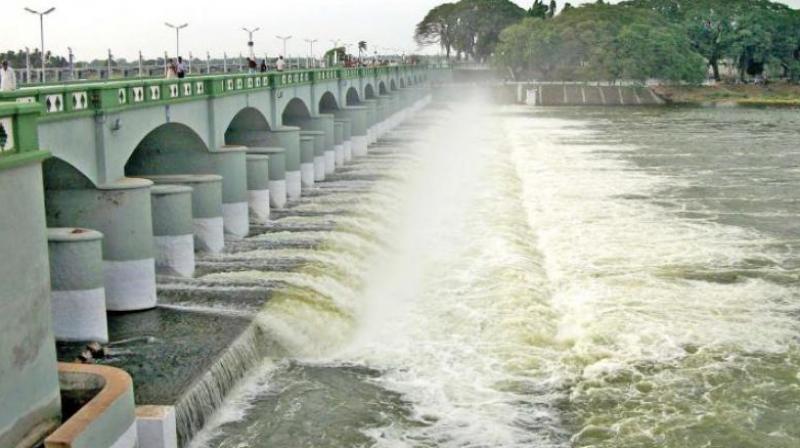SC verdict on 126-yr-old Cauvery water dispute today; TN, K'taka on edge

New Delhi: The Supreme Court will pronounce its verdict on Friday on a batch of appeals relating to the three decades old Cauvery water dispute among the States of Tamil nadu, Karnataka, Kerala and union territory of Puducherry.
A three-judge Bench of Chief Justices Dipak Misra and Justices Amitav Roy and DY Chandrachud had reserved judgment on September 20, 2017 on appeals against the Cauvery Disputes Tribunal's final award of February 2007 on allocation of water for Tamil Nadu, Karnataka and Kerala and Union Territory of Puducherry.
Out of 740 tmcft of water available in the Cauvery basin, the Tribunal directed Karnataka to release 192 tmcft of water to Tamil Nadu, and apportioned 270 tmcft to Karnataka; 30 tmcft to Kerala and seven tmcft to Puducherry.
Besides adjudicating the share of water of each State, the court is expected to frame a scheme and mechanism for implementation of the water sharing arrangement to resolve the tussle between Tamil Nadu and Karnataka on water release every month.
While it took nearly two decades for the Tribunal to render its final decision in 2007, it has taken a decade for the case to conclude in the cross appeals against the award filed by the States of Tamil nadu, Karnataka and Kerala.
The arguments which commenced on July 11, 2017 were advanced for 28 days by senior counsel Fali Nariman, Shyam Divan, Mohan Katarki for Karnataka; Shekar Naphade, G. Umapathy and Rakesh Diwedi for Tamil Nadu; Jaideep Gupta for Kerala and Solicitor General Ranjit Kumar for the Centre.
Tamil Nadu was of the view that the issue of framing a scheme for setting up of the Cauvery Management Board should not be left to the wisdom of Parliament.
It suggested that the court should exercise its inherent powers under Article 142 of the Constitution to frame a scheme for effective implementation of the judgment to allay the apprehensions of the States that Parliament might tinker with the scheme as it had been claiming that it had a right to modify, approve or
annual the decree.
It was argued that Tamil nadu which was dependent on Cauvery waters was always at the receiving end as Karnataka had never implemented in full any of the orders passed by the Cauvery Water Disputes Tribunal or by the court. Tamil Nadu maintained that it was easy to talk of co-operative federalism but Karnataka never adhered to this principle all these years.
Tamil Nadu rejected the Karnataka’s stand that allocation of water could be determined only at the end of crop season or at the end of the water year and Tamil Nadu was entitled to receive only 132 tmcft as against 192 tmcft ordered by the Tribunal.
Tamil Nadu said kuruvai crop was the main crop for Tamil Nadu and for this it was dependent on water from Karnataka during the southwest monsoon.
The other two crops of Samba and Thaladi,cultivated during the northeast monsoon were not dependable. Therefore the court should ensure that the monthly release of water by Karnataka as directed by the Tribunal should be strictly adhered to. Continuing its tirade against the findings of the Cauvery Water Disputes Tribunal, Karnataka on Thursday questioned the methodology adopted by the Tribunal in apportioning 192 tmcft of water to Tamil Nadu in the final award of February 2007 to the prejudice of Karnataka's interest.
Timeline
1892: First agreement between the Composite Madras Presidency and the princely State of Mysore on allocation of water.
1924: The agreement was renewed for 50 years
1974: The agreement signed between Madras Presidency and the princely State of Mysore in 1924 lapsed in 1974.
May 1990: Supreme Court accepts TN's plea and directs Centre to constitute Cauvery Water Dispute Tribunal.
June 2, 1990: Centrenotifies Cauvery Water Disputes Tribunal (CWDT).
January 1991: The CWDT rejects Tamil Nadu government's plea for interim relief. TN appeals in apex Court.
April 1991: Supreme Court directs the CWDT to entertain TN's petition for interim relief.
June 1991: The CWDT announces interim award: Karnataka ordered to release 205 tmcft.
Karnataka promulgates an Ordinance. Supreme Court intervenes, strikes down Karnataka's ordinance and upholds the interim award of the CWDT. Karnataka refuses to implement order.
December 11, 1991: The Interim award is published in the Government of India Gazette.
July 1993: Tamil Nadu Chief Minister Jayalalithaa goes on a sudden fast at the MGR memorial in Chennai demanding the Tamil Nadu's share of water as stipulated by the interim order.
August 1998: Centre forms Cauvery River Authority to ensure the implementation of the interim award of CWDT.
After 16 years, Cauvery Water Disputes Tribunal gives final award. Tribunal holds as valid the two agreements of 1892 and 1924 executed between the Governments of Madras and Mysore on the apportionment of water to Tamil Nadu.
May 10, 2013: Supreme Court directs Centre to set up a panel to supervise Cauvery water release.
May 24, 2013: Centre notified temporary Cauvery Water (Implementation of the order of 2007) Scheme.
July 2017: Final hearing of appeals begins in apex court. September 20, 2017 Verdict reserved.
February 16: Final verdict on appeals

